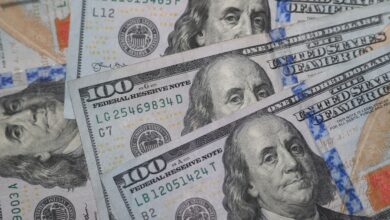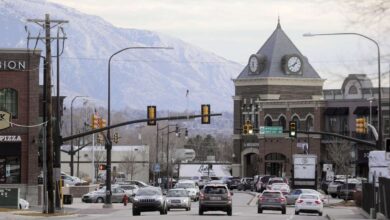Democrat opponent is a Black, LGBTQ, ex-missionary – Deseret News

At his first campaign stop, Democratic U.S. Senate candidate Nick Mitchell tried his hand at bulldogging at a rodeo in Duchesne County.
The 30-year-old South Salt Lake man trained with some Utah County cowboys for three weeks before climbing into the saddle on a borrowed horse on a recent summer night. Alas, the steer proved elusive. It outran him, and Mitchell, a former high school and college football player, never had a chance to wrestle the bovine to the ground.
New to the political scene, Mitchell said he jumped on a horse to reach out to rural communities.
“I thought, ‘What could I do that no other politician can or would do?’” he said. “That was a little bit different way to say, ‘Hey world, I’m here.’”
Catching two-term incumbent Republican Sen. Mike Lee will also be a challenge, especially for a Democrat in Utah. Voters in the overwhelming red state have not elected someone from the blue team to the Senate since 1970.
So far, two Republicans — former state lawmaker Becky Edwards and business and community leader Ally Isom — are taking on Lee for the GOP nomination. In addition to Mitchell, Democrats Austin Searle and Allen Glines are in the mix on the other side. All five have registered candidacies with the Federal Election Commission. Independent Evan McMullin, a 2016 independent candidate for president, also jumped into the race.
Utah has never elected a woman or a minority to the U.S. Senate.

Mitchell, who is Black, first set his sights on freshman GOP Rep. Burgess Owens in Utah’s 4th Congressional District. Very few Black people share his sentiment on issues such as Black Lives Matter and critical race theory, and he doesn’t deserve to be the person Black Utahns look toward for guidance on those issues, Mitchell said.
But then he heard Lee speak on television shortly after the Jan. 6 insurrection at the U.S. Capitol.
“He was just complaining and whining like he usually does. He didn’t impress as somebody that should be in the Senate,” Mitchell said.
Mitchell was adopted by a white family, which he said afforded him some white privilege.
“I didn’t really understand being Black that well,” he said.
He played football and lacrosse at Timpview High School in Provo and was also involved in theater. He served a mission for The Church of Jesus Christ of Latter-day Saints in the Philippines. He called his mission “fantastic” and said he learned a lot of things and has respect for Latter-day Saints, but no longer practices the religion.
After his missionary service, Mitchell went to the University of Utah where he walked onto the football team. Tired of getting his body wrecked at practice as an undersized defensive end, he quit to focus on studying chemical engineering. He didn’t graduate but used his knowledge of science to create tattoo ink for dark skin. He’s also working on a paint that would better illuminate highway lines.
A divorced father of a 5-year-old son, Mitchell came out as bisexual last year.
“It was a hard pill to swallow to begin with. I wasn’t very excited at the prospect of being bisexual,” he said.
Describing himself as “super toxically masculine” and having “manly man” hobbies including mechanics, woodworking and motorcycles, Mitchell said he had a lot to unpack regarding his sexuality. He said he was afraid people would see him as soft but wanted them to “accept me for my honest and true self.”

Mitchell is hanging his campaign on three main issues: climate change, health care and workers’ rights, all based on personal experiences.
Since spending part of his childhood in smog-filled Bakersfield, California, the environment has been top of mind for Mitchell. He said he would focus on developing renewable energy, including nuclear, wind and solar, to reduce carbon emissions.
A problem with his heart at age 23, which he said required multiple visits to the hospital on the same day before doctors would treat him, prompted him to look harder at the health care system. He said it should be more preventive. He also said he would take measures to stop collusion between hospitals, drug companies and insurance carriers. He supports universal health care.
“People shouldn’t have to decide if they need health care or food,” he said.
Mitchell’s stance on workers’ rights stems from his experience as a whistleblower at one company and being injured on the job when some trucking parts fell on him at another. He said he favors giving federal labor agencies more power over businesses, eliminating right-to-work and revamping worker compensation laws.
An unaffiliated voter for most of his life, Mitchell said he joined the Democratic Party to run for office in a two-party system because “I’m just not a Republican.” He didn’t offer a ringing endorsement of President Joe Biden, but said: “He’s a lot better than Trump. I’ll give him that.”
Mitchell said Biden offers more stability than the former president but could have handled the U.S. troop withdrawal from Afghanistan better. He also isn’t big on Biden’s vaccine mandate for businesses. He said he gets it, but people should just “do the right thing” and get the shot. He supports the infrastructure bill as well as the voting rights legislation under consideration in Congress.
“I think voting rights are what makes America America. The fact that trying to get rid of them in any form is outrageous. We should be expanding them. We should be able to use our phones to vote,” he said.
Because of the COVID-19 pandemic, Mitchell has limited his campaigning to virtual events and reaching out to local Democratic caucuses and county parties. Saying politics is prohibitively expensive, he intends to rely on voter contributions to fund his campaign.
























































